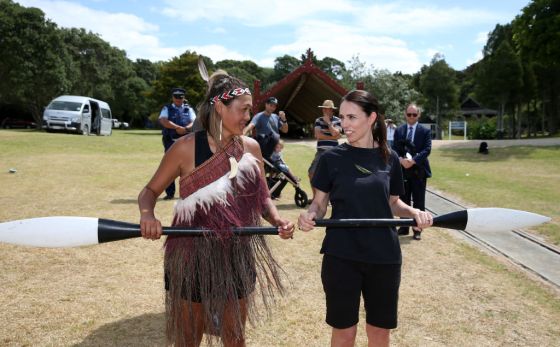New top story from Time: In New Zealand, ‘Hello’ Has Become ‘Kia Ora.’ Will That Save the Māori Language?
Kenny Williams began to study the Māori language during his second COVID-19 lockdown. Williams, 36, lives alone and the isolation made him yearn to feel closer to his identity as an indigenous New Zealander—an identity he had spent most of his childhood trying to hide.
After he ordered some Māori language books, he found his studies helped him build a connection to his Māori history. “I didn’t know it was a gap that was missing in my life,” he says.
It’s not just lockdown isolation—New Zealanders of all stripes are signing up to learn the language of the Māori people, New Zealand’s original inhabitants—“te reo Māori,” as it is widely called. But COVID-19 may have provided a boost: One university reported that 7,000 people accessed a free online Māori language and culture course in a 10-day period during lockdown.
The New Zealand government has pledged to ensure 1 million residents are able to speak basic Māori by 2040—an effort to revive a language that UNESCO has classified as “vulnerable”. The language has been incorporated into everyday life in ways both big and small. At sporting events, the national anthem is sung in both English and Māori language. Vodafone, the largest mobile network, changed the banner its cell phone users see on their screen from “Vodafone NZ” to “VF Aotearoa”. The meeting rooms in Microsoft’s Auckland office have Māori names, and Pic’s, a popular peanut butter brand, has translated its labels.

It’s also common for New Zealanders of all backgrounds to sprinkle Māori words and phrases into their speech. Almost every person interviewed for this story started the conversation with the greeting “kia ora,” instead of “hello.” Prime Minister Jacinda Ardern has championed the cause, and vowed that her daughter, 2, will grow up speaking Māori.
Read More: New Zealand’s Election Offers a Glimpse of a Calmer Democracy in the Time of COVID-19
The renewed interest in the Māori language also comes as New Zealand continues to wrestle with its colonial history—and representation for Māori culture. In the run-up to elections in September, the Māori Party—which aims to represent the interests of Māori people—called for the country to be renamed Aotearoa—the country’s Māori name, which translates to “land of the long white cloud.” The party won two seats in the election, after being shut out of parliament in 2017. While a quarter of Ardern’s cabinet is of Māori descent, Ardern has said now is not the right time to debate changing the country’s name.
Brought back from the brink
The language of New Zealand’s original inhabitants was still the country’s predominant tongue at the beginning of the 19th century, but it was suppressed over the following decades to ensure that Māori children assimilated with the growing number of English-speaking colonial arrivals. “My grandparents weren’t allowed to speak it, so they didn’t pass it down to my parents and my parents didn’t pass it down to me,” says Williams.
Today Māori people comprise about 16.5% of the population. But in 2013 only around 3.7% of the country’s 5 million people spoke the language. Those who speak it fluently are an even smaller number.
But experts say over the last five or so years, the number of people trying to learn the language has increased markedly. In late 2019, hundreds of people were on a waiting list for language classes at Auckland University of Technology. Ara Institute of Canterbury, a vocational training school, says Māori language enrollment jumped 35% between 2018 and 2019.
Driving the revitalization are both Māori people embracing their language, and non-Maori New Zealanders who are learning it to gain a better understanding of their national identity, for professional reasons or from a sense of moral obligation, according to researchers at Massey University. Ella Henry, an associate professor at Auckland University of Technology, says that language classes at her university are split into about 50% Maori and 50% non-Maori students.
Read More: Jacinda Ardern Helped New Zealand Beat Coronavirus. Next Up: Getting Re-Elected
Vivian Chandra, 39, who lives in Auckland says she’s been trying to learn the language on-and-off for about three years. “I feel that to respect the indigenous land that I live on, and to respect the indigenous people that have welcomed me to their country, I should speak their language,” says Chanda, who moved to New Zealand from Malaysia with her family as a small child.
Williams says he was bullied growing up as one of the only Māori students in his grade, so he did everything he could to disguise his heritage. But things have changed. “There’s definitely been a change in perception. There’s more of a willingness and openness to celebrate Māori [language] and Māori culture.”
“The acceptance and celebration of Māori culture in wider society in New Zealand is playing a part in the language’s revival,” says Henry, of Auckland University of Technology.
Reckoning with a colonial history

Although Māori culture is embraced, the impacts of colonization are still being addressed. In some instances, the use of Māori language has been criticized as token or performative. “There are some awful things that go on in this place, still, which are not addressed even remotely by the increasing propensity for people like me to use the odd phrase of te reo Māori,” says Richard Shaw, a politics professor at Massey University, who describes himself as “Pākehā”, the widely used Māori word for a New Zealander of European descent.
Māori people face worse outcomes than non-Māori people in many areas. The Māori unemployment rate is more than double the national rate, and Māori people earn about 21% less. They are more likely to get some diseases and they die about 7 years earlier. They are more than 2.5 times as likely to die from assault and homicide. In Auckland, more than 40% of the homeless people are Māori, despite being just 11% of the population.
But advocates hope the language’s integration may bring more public focus onto Māori affairs. “By learning the language I’ve learned a lot about the tikanga in te Ao Māori (cultural practices within the Māori worldview),” says Chandra, dropping in a few of the phrases she’s learned. “And that’s made me more aware of the contemporary as well as the historical issues in terms of the country that I’ve chosen to make my home.”
Counterintuitively, widespread interest in the language may actually be hurting it. Researchers said in a study published in early January that it is on a “pathway towards extinction” unless resources are put into teaching young Māori. Tessa Barrett-Walker, the study’s lead author, says that spreading the limited pool of proficient teachers too thinly across the general population is detrimental. “Learning among Māori should be prioritized initially,” she says.
Williams is confident that he’ll be able to reach fluency, and he recently surprised his grandfather by greeting him with a few Māori phrases when he arrived at a family gathering (COVID-19 is now under control in New Zealand).
“He would have loved the opportunity to pass te reo on to his family, but given the circumstances and the time that he lived in, he wasn’t able to do that,” says Williams. “That’s what I want to do, I want to be able to carry that tradition on.”
Comments
Post a Comment